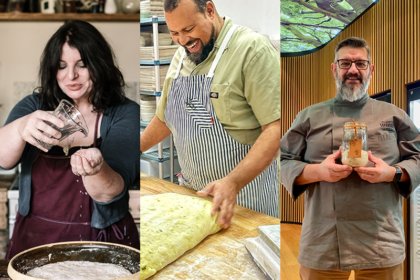
Homebound during the Covid-19 outbreak, budding home bakers around the globe made sourdough baking their new hobby. Hailed as the “breakout star of pandemic-era kitchens” by The New York Times, sourdough became a national fascination as more people experimented with the microbe-enabled, tangy bread.
We asked three experts to share their thoughts on the sourdough craze — educator Vanessa Kimbell (of The Sourdough School), bakery owner Azikiwee Anderson (Rize Up Bakery) and Karl De Smedt, curator of the world’s only sourdough starter library.
The question: How did the pandemic change the market for professionally-baked sourdough? Are more people making their own or are they buying from professional bakers?
Vanessa Kimbell, founder The Sourdough School
The pandemic changed the market in several ways. The first thing is, some of the large manufacturers that I’ve been talking to have been starting to appreciate and understand that people want real sourdough. And by that I mean sourdough that is genuinely long, slow fermented with wild yeast and lactic acid bacteria. They’ve also begun to appreciate the connection between bread and health. Authenticity and integrity are the two words that come to my mind when I think about how the pandemic has impacted the professional sourdough market.
There’s no question that there was an exponential increase in home bakers making sourdough during the pandemic. It’s rather beautiful. I think when we were gifted the time to make those connections, so many of us used that. Will there be sudden change in behavior? People have now gone back to work and now I’d say there’s almost been a backlash against people wanting to take up sourdough. It became almost too trendy to the point where there can be a backlash. I have noticed there was a significant drop off as life has returned to normal. But that’s only to be expected. The joy of discovering we have a little freedom as a home baker making their own bread, I’d say it’s leveling back out again to pre-pandemic numbers.
Azikiwee Anderson, founder Rize Up Bakery
I started baking like most of the world did during the pandemic. Normally we would all just go to the store and pick up whatever mediocre bread they had on hand, never thinking twice [that] it was full of preservatives and made with cheap industrial flour. Then all of sudden we had the thing that is always in short supply “TIME”! So we all tried to connect to the nostalgia of being self-sufficient since we had no real control over most things.
The sheer amount of people connecting to their food and what it is made of is what made it amazing for small new found bakers like me! The uptick in sourdough baking taught millions of people how hard it is and how good it could be. What more is there to say!
Karl De Smedt, curator The Sourdough Library, senior communication and training manager Puratos Center for Bread Flavour
Many consumers today are excited about sourdough bread. During the pandemic, many have started baking it at home and, on social media, sourdough reached a massive peak as a sign of consumer engagement. No wonder because it truly has a unique, rich taste. According to research by Puratos, 52% of today’s consumers know sourdough . Approximately 45% of consumers associate sourdough with “better taste” and nearly 30% associate sourdough with “Rustic,” “Healthier,” and “More Natural” – opening an excellent opportunity for value creation.
For professionally-baked sourdough, there are immense opportunities. The most considerable evolution we see is that it will not matter who makes the bread in the future, but how it’s made — going from fast processes in two to three hours with only baker’s yeast. Or long processes with sourdough from 12 to 48 hours. A project like the Puratos sourdough library aims to discover more about the use of sourdough in all its aspects. We are sharing knowledge, preserving, and protecting the biodiversity of sourdough and bringing back the tradition used by more than 250 generations of bakers who used sourdough as their most precious ingredient in bread baking. That’s why, at Puratos, we believe the future of bread lies in its past.
